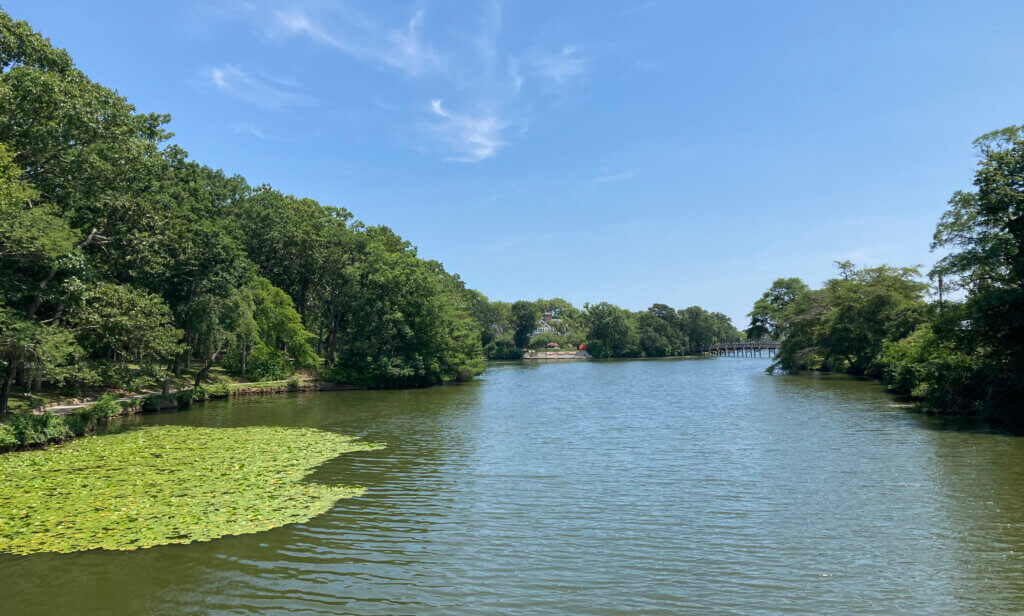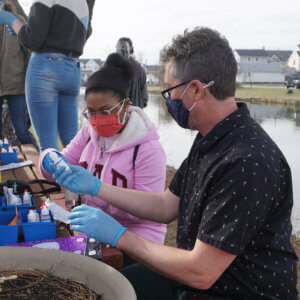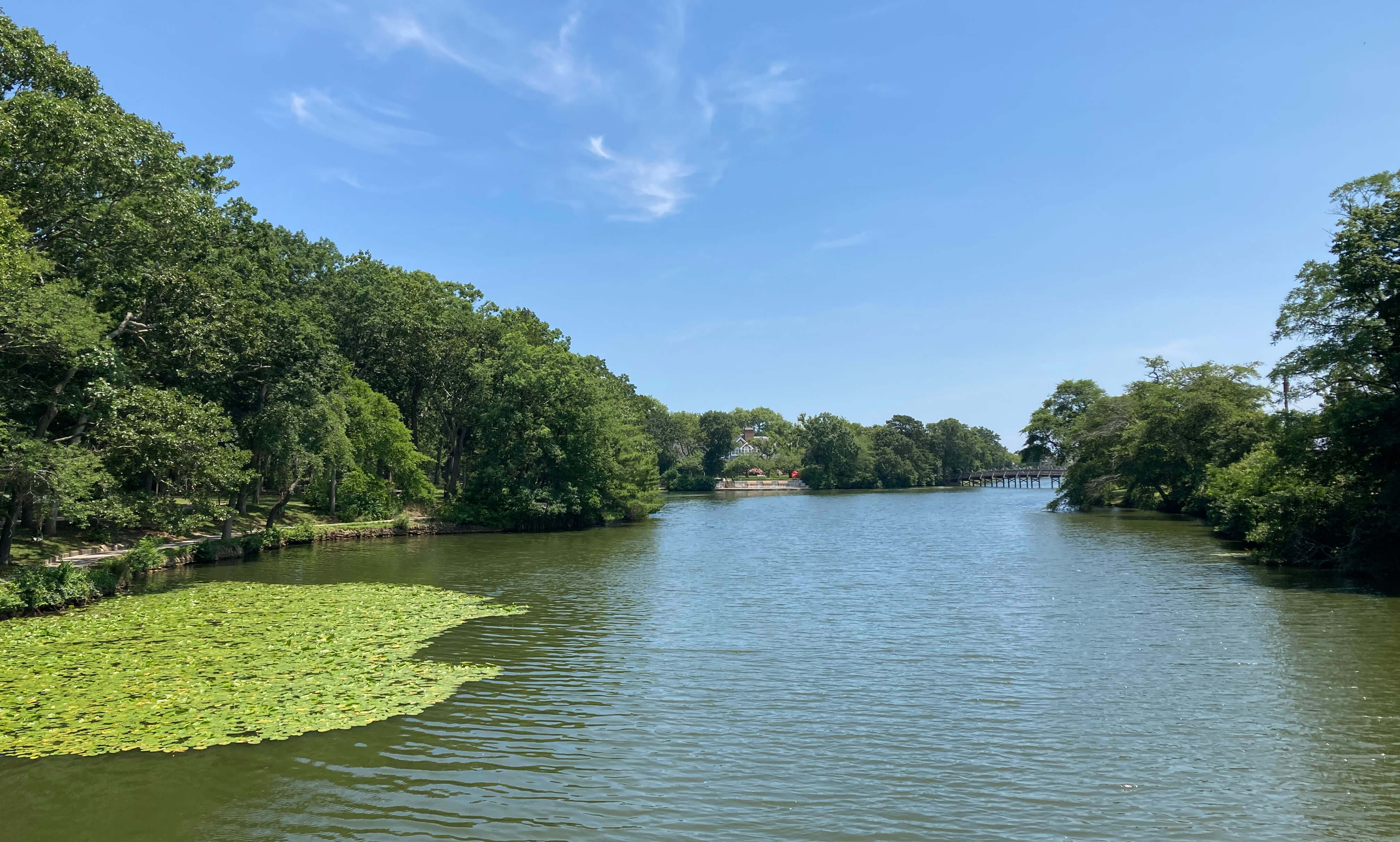
The Monmouth University Urban Coast Institute (UCI) has received a $150,000 grant from the Jules L. Plangere, Jr. Family Foundation to extend and expand a program that partners scientists and students with community volunteers to monitor the health of coastal lakes.
The funding will allow the Coastal Lakes Observing Network (CLONet) project to continue through the summer of 2023 and facilitate the purchase of handheld probes that enable volunteers to measure harmful algal bloom (HAB) levels in their community lakes. The grant has also made it possible for the UCI to establish a citizen science coordinator position to oversee the day-to-day management of CLONet, including the analysis and monitoring of sampling data, organizing coastal lake summits on campus, and guiding multiple CLONet lake groups and individual samplers.
 Through CLONet, university scientists and students have trained and equipped community members to sample Monmouth County’s beach-adjacent lakes for properties such as temperature, salinity, clarity and dissolved oxygen levels, then file their readings into an online database. Since the summer of 2019, citizen scientists have been sampling Deal Lake, Fletcher Lake, Lake Como, Lake Takanassee, Sunset Lake, Sylvan Lake and Wesley Lake. Monmouth students and scientists have supplemented the data by regularly sampling the same bodies, along with Silver Lake, Spring Lake, Sylvan Lake and Wreck Pond.
Through CLONet, university scientists and students have trained and equipped community members to sample Monmouth County’s beach-adjacent lakes for properties such as temperature, salinity, clarity and dissolved oxygen levels, then file their readings into an online database. Since the summer of 2019, citizen scientists have been sampling Deal Lake, Fletcher Lake, Lake Como, Lake Takanassee, Sunset Lake, Sylvan Lake and Wesley Lake. Monmouth students and scientists have supplemented the data by regularly sampling the same bodies, along with Silver Lake, Spring Lake, Sylvan Lake and Wreck Pond.
With two years of data now on file, CLONet has determined a baseline of normal conditions for each lake that can be used to discern how recent developments such as weather events, waterfront construction projects or the implementation of new stormwater filtration measures are impacting the waters. The detection of sudden shifts in lake conditions can be used to predict, and perhaps thwart, the onset of HABs, according to Endowed Associate Professor of Marine Science and CLONet coordinator Jason Adolf.
The new probes being provided to samplers will enable them for the first time to collect data on HAB biomass that can be contributed to the New Jersey Department of Environmental Protection’s (NJDEP) online HAB Interactive Map Reporting and Communication System. Prior, only Monmouth’s scientists and students had access to the equipment, limiting the collection of information.
“The HABs issue has received increasing attention in New Jersey in the last several years, particularly following the closures of Lake Hopatcong and Greenwood Lake in 2019 that caused major losses in tourism revenue,” said Adolf, who co-leads a HAB Expert Team formed by Gov. Phil Murphy to provide input to the NJDEP. “Unfortunately, we expect climate change will make HABS all the more common in urbanized areas like the Jersey Shore by overheating our lakes and allowing more intense coastal storms that overload the waters with nutrients. The data collected by CLONet’s citizen scientists can help us get ahead of HAB events by spotting the warning signs instead of repeatedly reacting to them after they occur.”
The roughly 650 samples collected by the volunteers as of July have already provided insights into the conditions of the lakes, among them:
- Poor Quality: On a four-tier scale ranging from oligotrophic (best) to hypereutrophic (worst) conditions, the lakes overall fell in the latter category. Typical characteristics of hypereutrophic water bodies include an abundance of nutrients that fuel HABs, low dissolved oxygen levels, occasional fish kill events, and the presence of thick scum and dense weeds.
- Ideal HAB Conditions: Data shows the lakes are most susceptible to HABs from June through September. Links between rainfall and HAB occurrence are suspected and are being investigated using CLONet data.
- Diversity of Lakes: Although they’re similar sized and only miles apart, the lakes vary significantly. Overall water quality (Takanassee consistently rated highest of the group), water properties and even water colors were distinct from body to body.
- Warming Waters: Historic data on the lakes’ conditions is scarce, but measures taken in a study of Deal Lake in the 1970s indicate that its temperature is significantly higher today.
Those interested in joining a CLONet lake sampling team are encouraged to email Citizen Science Coordinator Erin Conlon at econlon@monmouth.edu. Volunteers will be provided free sampling kits and training and can conduct the work as their schedules permit.
“No one knows more about the lakes than the people who live in their neighborhoods, and that local knowledge has been an important asset for CLONet,” Conlon said. “It’s been a pleasure watching the project strengthen our volunteers’ bonds with the lakes and I believe that will go a long way toward protecting these waters in the future.”

